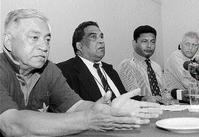Shelly Ann Thompson, Staff Reporter
Talat Ali (left), Pakistan team manager, addresses journalists on March 19 at a press conference called to discuss the autopsy report of Pakistan coach, Bob Woolmer, who died the previous day at the University Hospital of the West Indies. Looking on are Karl Angell (second left), director of communications at the Jamaica Constabulary Force; Pervez Mir (second right), media Manager for the Pakistan team; and, Deputy Commissioner of Police, Mark Shields. - Ricardo Makyn/Staff Photographer
Pathologists in Jamaica are somewhat unknown until there is a suspicious cause of death. Recently, there has been much talk about pathology, following the death of Pakistan cricket coach, Bob Woolmer.
However, pathology is not only about dealing with dead bodies.
Dr. Suzanne Shirley of the Jamaican Association of Clinical Pathologists says, "Everybody thinks that pathology stops at forensic (pathology), but there is much more to the field than that."
A pathologist is someone who has done specialised postgraduate work in the field. It is one of the longest postgraduate training programmes, encompassing four to eight years. At the University of the West Indies, Mona, a postgraduate degree in general pathology is offered. Fields of study include anatomical and chemical pathology and haematology.
Autopsies small part of pathology
According to Dr. Jephthah Ford, autopsies are a small part of pathology work. "They mostly do diagnosis and differentiation of tissues and other substances taken from the body," Dr. Ford said.
"So, for example, they play an important role in the diagnosis of diseases," he added.
Dr. Ford explained that locally, medical doctors are exposed to pathology as a part of their studies.
"So, technically, every doctor who is in Jamaica could be referred to as a pathologist. They (general doctors) can also dissect a body and give an opinion as to the cause of death," said Dr. Ford.
In Jamaica, there is no specialised forensic training. So, many students, after general pathology training, venture overseas for training in specialised areas, such as forensic pathology.
"There is no specialist forensic training offered locally, and as such, those working in this branch of our field receive training elsewhere," said Dr. Shirley.

